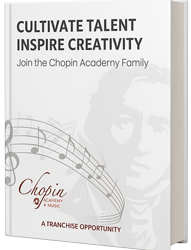Musicians often face a tough balancing act: how to sustain a career that honors their creativity while also achieving financial security. Traditional options like private lessons or live performance offer flexibility, but results can often be inconsistent or hard to scale. That’s why many professionals are exploring business ideas for musicians that combine their passion with a sustainable model.
One option that’s rising in popularity is the music education franchise route. In this guide, we’ll compare this model with independent teaching, explore today’s music teacher opportunities, and introduce the Chopin Academy of Music as a case study in franchise ownership that provides real results.
Independent Teaching vs. Music Franchise for Sale: A Side-by-Side Look
Many musicians start their careers with independent teaching, while others may consider a music franchise for sale as an initial path toward growth. Here’s a balanced comparison, which illustrates that, while each route can work, choosing which approach to adopt will depend on your priorities, resources, and long-term goals.
| Factor | Independent Teaching | Music Franchise Ownership |
| Creative Control | Full—set your own methods | Moderate—follow franchise systems |
| Startup Cost | Low to moderate | High (initial investment and fees) |
| Admin Work | Full responsibility | Shared—support from franchisor |
| Marketing | DIY and word of mouth | Brand recognition and materials |
| Scalability | Limited | Structured for growth |
| Income Predictability | Variable | More stable with systems in place |
What Music Teacher Opportunities Look Like Today
As the education landscape shifts, many music teachers are rethinking how they build their careers. With fewer academic positions available and a growing interest in private instruction, educators are looking beyond traditional roles to find more stability and growth. This has led to a wider range of music teacher opportunities, with some rooted in one-on-one teaching and others focused on structured business models or franchise systems.
Common challenges teachers face today include:
- Unpredictable income from freelance or private lessons
- Limited professional growth without business support
- Difficulty marketing services and retaining students
- Lack of mentorship or collaborative teaching environments
These realities are driving educators to seek opportunities that provide more consistency, support, and potential for long-term impact.
Why Some Educators Consider Franchising
- Offers business coaching, marketing templates, and curriculum
- Streamlines enrollment, scheduling, and financial tracking
- Allows educators to focus on teaching while growing a business
Still, some may feel constrained by standardized approaches and franchise rules. The best music teacher opportunities are those that fit your lifestyle and leadership style.
What to Know Before Buying a Music Franchise
For musicians considering a more structured path to entrepreneurship, purchasing a music franchise for sale can be an appealing option. It offers a ready-made framework, brand visibility, and support, but it also requires careful evaluation. Understanding both the advantages and limitations of this model is crucial before making a decision that impacts your finances, teaching objectives, and long-term goals.
Benefits
- Access to a proven curriculum and systems
- Established brand credibility
- Peer network and franchisor support
- Tools for long-term scalability
Drawbacks
- Franchise fees and royalty payments
- Less flexibility in teaching methods
- Business performance still depends on your effort and location
- Commitment to operating within set guidelines
Case Example: Chopin Academy of Music
Founded in 2005, Chopin Academy of Music blends a classical approach to music education with a modern business structure. The academy proudly offers a franchise program designed specifically for musicians transitioning into entrepreneurship.
What You Get as a Franchisee:
- A choice of three study tracks: general, exam-focused, and competition
- Training in operations, marketing, and curriculum delivery
- Exclusive teaching tools and performance programs (e.g., Carnegie Debut track)
- Ongoing support from headquarters and a growing national network
Startup Investment:
Your initial investment is estimated to be between $196,250 and $493,625, which includes a $40,000 franchise fee. Specific costs can vary based on location size and build-out requirements, so be sure to refer to the Franchise Disclosure Document (FDD) for a detailed breakdown of costs. For more information, please see our FAQ.
This model is well suited for musicians ready to take on a leadership role while staying rooted in performance and education. However, results will depend on your personal market and execution and not just the brand name alone.
The Bigger Picture: Business Ideas for Musicians in a Growing Market
The global music education industry is expanding steadily, offering more paths for musicians to turn their skills into business ventures.
Key stats:
- Projected growth from $6.3B (2023) to $11.2B (2032)
- 123,900+ music teachers currently working in the U.S.
- Classical music interest growing in both streaming and in-person formats
This makes now a great time to explore diverse business ideas for musicians, and especially those which combine personal passion with strategic support.
Should You Choose a Franchise or Go Independent?
Choosing between investing in a franchise and teaching independently comes down to your vision, resources, and work style. If you’re looking for autonomy and want to build something entirely your own, going independent might be the right fit. On the other hand, if you value structure, brand support, and a faster path to scalability, a franchise model could offer the tools and guidance you need to grow with confidence.
Go Independent If You:
- Prefer full control over curriculum and daily operations
- Are starting small or testing the waters
- Don’t want ongoing fees or structured systems
- Thrive on DIY solutions and gradual growth
Consider a Franchise If You:
- Want to scale faster with an existing brand
- Value mentorship, structure, and administrative support
- Are prepared to invest time and capital up front
- Enjoy working within proven systems to enhance education and student retention
Choosing the Right Model for Your Music Career
The best business ideas for musicians are those that align with your ambitions, lifestyle, and approach to teaching. Whether you’re building a studio from scratch or considering a music franchise for sale, the key is clarity, not just about the opportunity, but about what you want your career to look like.
Franchises like Chopin Academy of Music can offer you a head start via built-in systems, preexisting brand strength, and operational support. However, success still depends on your commitment and leadership. Independent teaching offers creative freedom and full control, but requires more time, effort, and patience to grow.
In the end, the right path is the one that allows you to thrive both artistically and professionally, while making a lasting impact on your students and your community. To learn more about franchising with Chopin Academy of Music, visit our website today!




